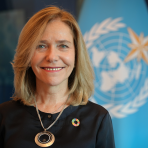Statement by Prof. Celeste Saulo, WMO Secretary-General, on the occasion of the launch of the Regional State of the Climate in Asia 2024
Every year, Asia counts the human and economic toll of extreme weather and climate impacts: floods, landslides, tropical cyclones, heatwaves and droughts. Behind every number, there is a name, a home, a community disrupted or lost.
My message today is clear: WMO’s role to turn science into action is more essential than ever before. We are better than ever at saving lives – but we need to do more to protect livelihoods.
The State of the Climate in Asia 2024 confirms what many already feel: this region is warming almost twice as fast as the global average.
From coastal cities to the high mountains, the consequences are clear.
Glacier loss is threatening future water supplies and leading to more short-term disasters.
Rising ocean temperatures and marine heatwaves are harming marine ecosystems and economies.
Heatwaves are harming health, energy supplies and education.
Extreme rainfall and flooding destroys and displaces communities.
And so the list goes on.
And the poorest, as always, bear the greatest burden.
Yet, this report is not only a warning—it is a call to action.
It shows that when anticipatory action is in place, lives are saved. In Nepal, coordinated efforts ahead of record-breaking rainfall reached over 130,000 people before disaster struck.
This is the power of partnership. This is the value of early warning and early action.
WMO is deeply grateful to all National Meteorological and Hydrological Services, to ESCAP, and across the UN system who contributed to this important regional report.
Dear partners, dear friends
WMO this year celebrates its 75th anniversary. It has always been a place where cooperation precedes crisis. Where data is openly shared. Where operational trust is not aspirational — it is daily practice.
That foundation remains our strength. But the world around us is shifting.
So we need to strengthen our strategic messaging if we are to stay visible and to stay relevant.
We must tell decision-makers in Asia and throughout the world:
There is no resilient development, no food security, no disaster risk reduction, no climate action — without the services, science and infrastructure that we, collectively, provide.
- When we talk about data exchange, let’s connect it to diplomacy and security.
- When we discuss warnings, let’s link them to public trust and institutional legitimacy.
- When we invest in hydrology, let’s show how it underpins peace and agricultural and food systems.
Together, we are building the evidence and capacity that our region—and our planet—needs.
To conclude:
Let us treat this report not as a conclusion, but as a catalyst. For delivering early warnings for all. For putting climate science in the hands of every policymaker, every community.
Because science is not just data. It is protection. It is dignity. It is hope. And the time to act—together—is now.
Statement by


